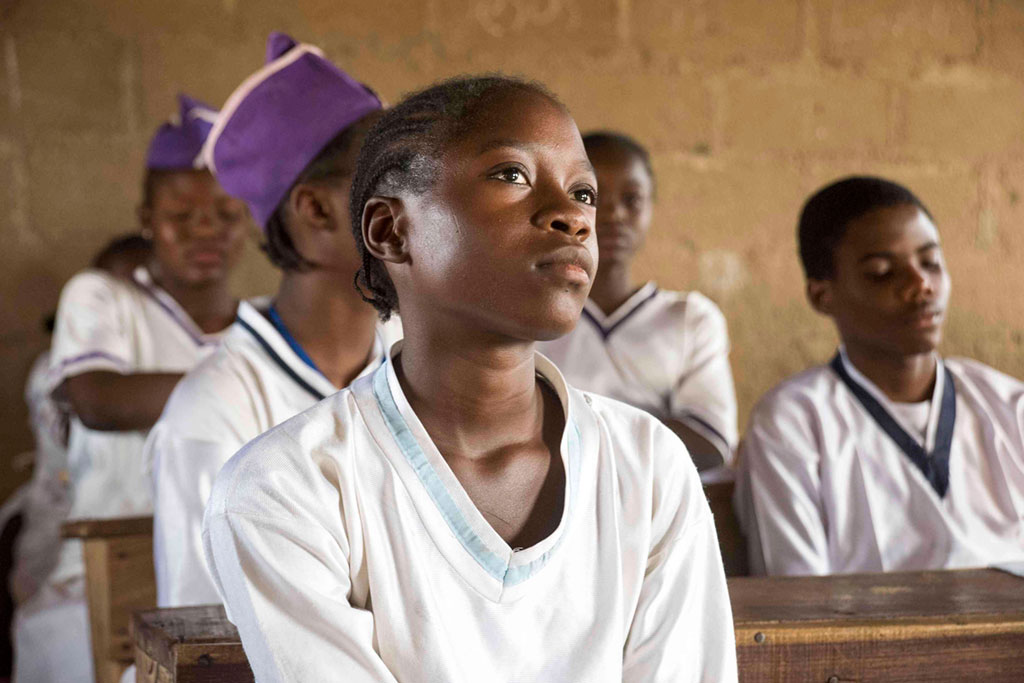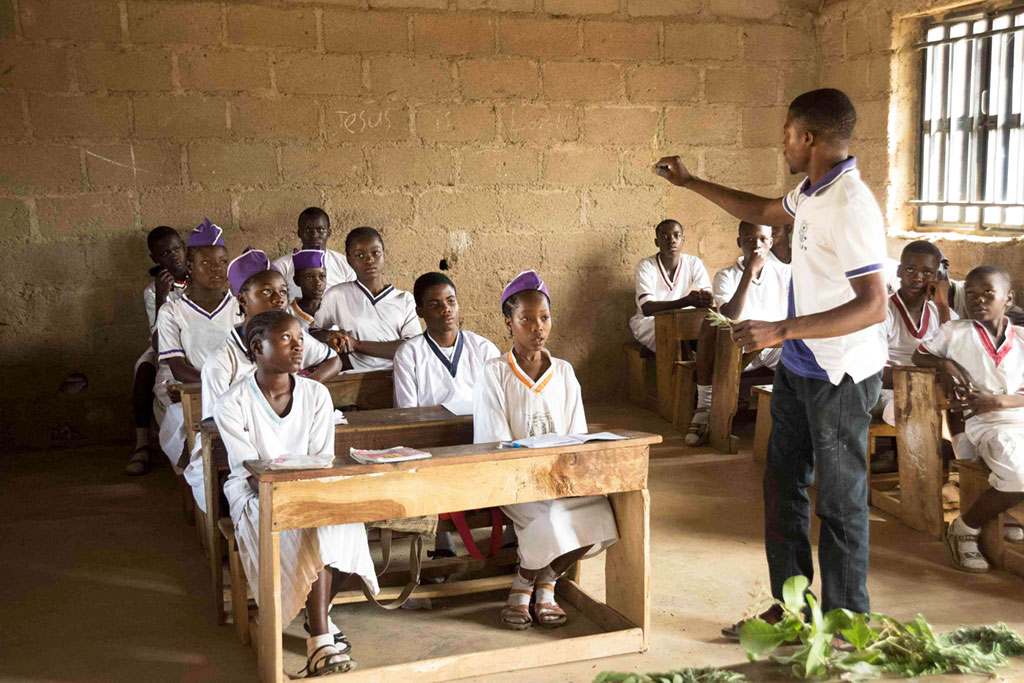Lillian lived with her sister and parents in Yobe State when the Boko Haram attacks began. They escaped to Adamawa, and 14 year-old Lillian enrolled in boarding school. Just a few days later, insurgents assaulted.
“We ran out, not knowing where we are going until late evening,” Lillian remembers. “When we realized we were in the bush, we wandered around until we found a convenient place and we slept there. The following morning, we kept trekking until we reached a major road, where we were given a lift back home.”
Attacks on the next two schools Lillian attended sent her running again and again. When her family finally decided to escape the area entirely, she was forced to abandon her education.
Violence stalks the children of northern Nigeria. They flee attacks on their villages, their homes, their schools. As they run, they leave behind belongings. Friends. Hope. Boko Haram violence has displaced more than 1 million school-age children and youth.
The program is not only reading and numeracy. It’s talking about [the] social and emotional life skills of the kids—how to form friends, how to relate, how to plan for their future. Ayo Oladini, Director, Nigeria Education Crisis Response program
A program funded through the U.S. Agency for International Development is trying to restore these children’s academic futures. The Education Crisis Response Program offers northern Nigerian children like Lillian a chance to resume their educations at learning centers set up especially for internally displaced children. USAID’s project is implemented by Creative Associates International, International Rescue Committee and more than two dozen Nigerian organizations.
When they successfully complete the curriculum there, they can be “mainstreamed,” which means they are eligible to go back into the formal school system. Out of 14,000 displaced children who enrolled in the non-formal learning centers, 10,000 of them passed state-administered educational exams that are required before they are mainstreamed.
The program also identifies schools that can accept students transitioning back and trains teachers there on how to receive them.
“They’re already traumatized,” Project Director Ayo Oladini tells educators at schools about to take in program graduates. “They need more love. They need more hope.”
For children like Lillian, who completed the Education Crisis Response’s curriculum and won a spot at a formal school this year, going back to regular classes means more than a way to rejoin mainstream society. It means reclaiming a piece of normalcy in a scary, uncertain world. It means finding a path back to a childhood that seemed abruptly snatched away and renewing a hope that the future will be worth dreaming about.
Making up for lost time
Although state and federal government knew about the problem of displaced children who were not attending school, they had no plans in place to address something so pernicious as the Boko Haram insurgency.
“Until our program…came in, nobody had a clue on how to provide education for this group of people,” says Oladini.
So in collaboration with government, civil society and communities in Bauchi, Gombe, Adamawa, Yobe and Borno states, the Education Crisis Response program will establish more than 1,100 non-formal learning centers. There, displaced children receive three years of basic literacy and math crunched into a nine-month curriculum.

Many of these children have already been out of school for two years by the time they enroll at one of the centers.
“The program is not only reading and numeracy,” says Oladini. “It’s talking about [the] social and emotional life skills of the kids—how to form friends, how to relate, how to plan for their future and so on.”
The displaced children come to the center three times a week for three hours a day. Teachers who impart the lessons have received special training on friendly and effective classroom methods that often put the centers a step above Nigeria’s existing schools: Local kids in their school uniforms show up at the non-formal learning centers begging to come to class there instead.
“They’ve seen a lot of difference between the three hour per day of our class and that of a formal school,” says Oladini. “When you attend a three hour program in a day in a non-formal learning center, it’s activity-based, it’s intensive, it’s involving, it’s rewarding for the kids.”
Still, the chance to graduate from one of Nigeria’s formal schools with a degree in hand is something displaced children hold dear. Those who are mainstreamed back into the system feel a renewed sense of purpose and optimism.
“Many of them never thought they would go to school again,” says Joel Jijingi, Director of the Zion Pilgrims’ Christ School in Bauchi state. “So an opportunity to go to school was so exciting to them. They felt so happy.”
Turning displaced children back into students
When Joel Jijingi founded the Zion Pilgrims’ Christ School in 1999, he wanted it to serve the children with some of the greatest needs: the orphans, the vulnerable and others who could not afford to pay the fees to attend distant, private schools—at that time the only option.
One day, after Boko Haram’s violence had already scattered hundreds of thousands of school-aged children around northern Nigeria, Joel Jijingi’s wife Eleojo Jijingi noticed children running around in a neighbor’s compound. The neighbor told her that the nine children staying with her were displaced.
“I'm looking forward to seeing one of [the students] that will take us to one of the farthest stars." Joel Jijingi, Founder, Zion Pilgrims’ Christ School
“‘How do you take care of them?’” Eleojo Jijingi asked her neighbor. “‘How do you feed them?’ She said it is God that is helping them.”
When Eleojo Jijingi found out the children were not enrolled in school, she knew she and her husband had to reach out. She told her neighbor to spread the word: internally displaced children would be welcomed at Zion Pilgrims’ Christ School.
In addition to the 780 children enrolled in the school, the Jijingis set up the non-formal Kagadama learning center, where displaced children could come to resume their studies and try to maintain a forward trajectory and a childhood.
The center linked up with USAID’s Education Crisis Response Program, which provided training for its specialized teachers, organized community coalitions, connections to the appropriate state authorities and even organizations that could donate supplies like chalkboards and textbooks.

The program also works with the non-formal learning centers and state governments to identify formal schools that will accept students who complete the curriculum and perform well.
“I just believe that inside some of these children, among them, they are going to be great people tomorrow,” says Joel Jijingi. “I’m looking forward to seeing one of them that will take us to one of the farthest stars. And the only way to do that is to give them education.”
In 2015, 100 displaced children came to Kagadama, where Eleojo Jijingi serves as facilitator, relying on 30 teachers to volunteer extra classroom time. They learn to read, write and deal with the social and emotional trauma of their experiences.
One child told Joel Jijingi that arriving at Kagadama was like going to heaven. The school is well organized, has rudimentary equipment and a very caring staff. More than anything, it feels safe and calm. And for these children, that is paradise.
Finding new focus for education
Lillian was one of those children Eleojo Jijingi noticed hanging out in her neighbor’s compound, out of school and unsure if she would ever get the chance to complete her education.
After completing the nine-month curriculum at Kagadama, she was one of 12 students who received a scholarship to mainstream into Zion Pilgrim’s Christ School.
Many more qualify to mainstream but have not, since it is the local government’s responsibility to complete the process. Of the 10,000 students who passed the tests, about 4,000 have matriculated at formal schools so far.
“It’s the right of every Nigerian child to be educated,” says Oladini. “Our hope is to work with government to facilitate…the process of bringing them back from [a] state of no education back to school and for government to take that on.”
Oladini says next year communities and governments will likely be better prepared to step up these efforts.
Children who do find out they have a slot in a formal school are often thrilled. When Joel Jijingi gave one family the good news that their children would be starting classes at Zion Pilgrims’ Church School on scholarship, they told him they were too excited to sleep all weekend.
Lillian says just feeling safe is helping her enjoy school more and do better.
“While we were in previous schools, there was no peace,” Lillian says. She couldn’t concentrate on the lessons or pay much attention in class, which of course made it hard to understand the material.
“It was like I was out of my senses,” she says. “Thank God we are now concentrating and understanding what is being taught.”
Lillian says she studies hard so that she can one day achieve her dream of becoming a nurse. She has made friends at school. They read together, play together.
“We do not fight,” Lillian says.
Like her, many of them were not sure they’d ever step inside a classroom again. According to Joel Jijingi, their relief at being back in school lends these children much greater focus. As he says, “They saw this as an opportunity they cannot just take for granted.”
Reported from Nigeria by Michael J. Zamba and Aishatu Aminu.
